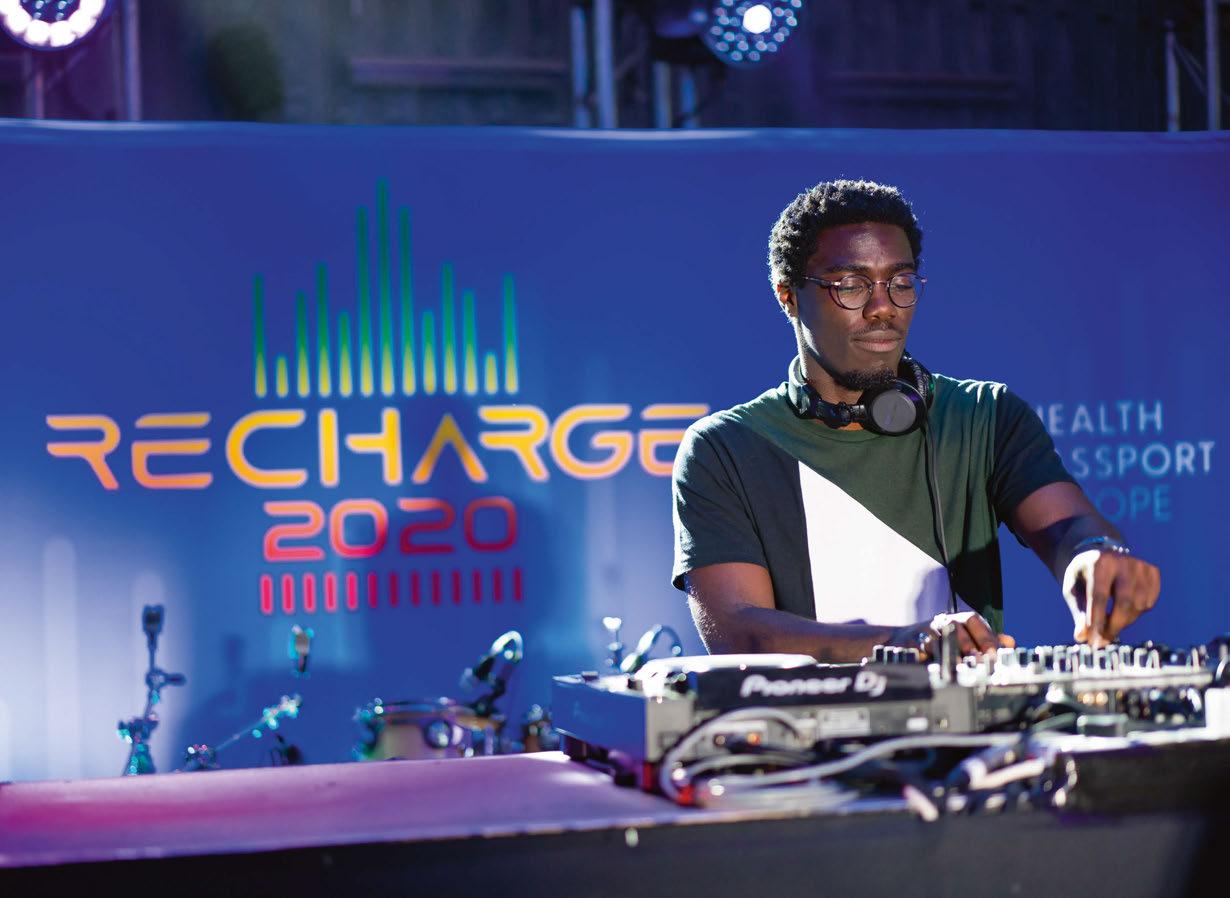
7 minute read
REGIONAL ROUND-UP
RECHARGE 2020
HEALTH PASSPORT EUROPE PARTNERS WITH BIG CONCERTS AND THE ENTERTAINMENT GROUP TO SAFELY REOPEN THE SOUTH AFRICAN EVENTS INDUSTRY.
For most countries around the world, the prospect of a live event with multiple DJs and musicians playing to a traditional in-person audience in 2020 was nothing short of a pipedream. However, thanks to an innovative new platform from Irish-based Health Passport Europe, Cape Town was able to host exactly that, as RECHARGE 2020 took place on 21 December.
Held at the Grand Café & Beach, the event utilised the latest developments in rapid COVID-19 testing, combined with the secure Health Passport Europe mobile technology, in order to make everything as safe as possible for all staff, performers and guests. Representing an important step towards the wider opening of events in 2021, RECHARGE 2020 passed off without a hitch. The concept was very effective.
Ahead of the event, all attendees including staff and performers were required to download and set up the Health Passport Europe mobile app for free. On the day of the event, everyone was tested for COVID-19 using the latest rapid antigen tests (again for free), which are approved for use in South Africa. Within 20 minutes of testing, results were returned and updated securely to each person’s Health Passport Europe app. At event entry, security staff scanned each person’s Health Passport Europe app and also their event ticket. All those who entered the event had negative test results. COVID-19 health guidelines were adhered to by all within the event site to ensure the lowest level of risk for all.
There were multiple positive detections made at the rapid testing centre. Those who returned a positive test were referred for a followup PCR test in order to confirm the diagnosis, before being given professional medical advice in line with the national health guidelines.
“This was an important moment for the events industry, which has been devastated by the pandemic,” Justin Van Wyk, CEO of
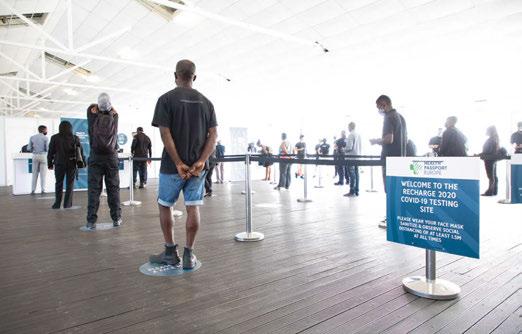
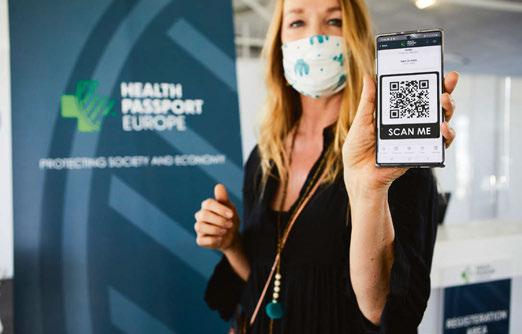
Big Concerts commented. “Using the Health Passport Europe platform allowed this event to proceed with the highest levels of risk mitigation, demonstrating the way forward for live events globally. The system allowed us to offer pre and post-event testing for maximum reassurance, protecting attendees, performers and everyone connected with the event.”
Robert Quirke, Founder of Health Passport Europe, said: “Our team is excited and humbled to have worked on this project for Cape Town and to have contributed to the safe reopening of international entertainment and tourism. The secure technology is engineered to work with all official COVID-19 tests and vaccinations. Many thousands of people are already using the mobile system and it is helping industries to return.”
Speaking to TPMEA from his Dublin head office after the event, Quirke recalled how the concept for Health Passport Europe came to be. “Building this platform for the world to use is based on a global need in a time of crisis and emergency,” he began. “Back in February last year, we put in place a three-phase model to respond to COVID-19: ‘survive, protect, thrive’.” The ‘thrive’ phase is all about finding ways for society and economy to recover safely and efficiently. “Health Passport Europe was built to quickly help to kickstart the global economy again – whether that’s an airline, a live concert, a conference or a sporting event – the system and process is designed to support that,” he explained.
As the Cape Town test event proved the concept, Quirke recalled how even the attendees were emotional at being given the chance to get back to some semblance of normality. “A lot of people were very emotional,” he revealed. “Anyone who has ever produced an event will know that the most important aspect is in the crowd, so when you see the emotional release for the audience and give them some hope for the future, it’s really special.”
With more than 500 tests carried out ahead of the event and 30 positive results being returned – each of which was confirmed with a follow-up PCR test – Quirke made the point that not only did this event not contribute to the spread of the virus, but it actively contributed to the suppression of it. “Each of those 30 people would not have otherwise been tested if it wasn’t for this project,” he commented. “Those people were out in the community, completely unaware that they had the virus, until they had their test and just by this one event, we directly contributed to helping to stop the spread of the virus in that community.”
With the platform already being quickly adopted by many leading medical and pharmacy organisations and having been tested extensively across a range of industries including healthcare, logistics, hospitality, education and nursing homes, as well as a trial at Dublin Airport, Health Passport Europe could well represent a viable route for the global economy to bounce back.
When it comes to live events – an industry that has suffered worse than most at the hands of the pandemic – a platform that means live events can not only avoid the transmission of COVID-19 but actively suppress it could be just the boost the sector needs. Photos: Health Passport Europe www.healthpassporteurope.com
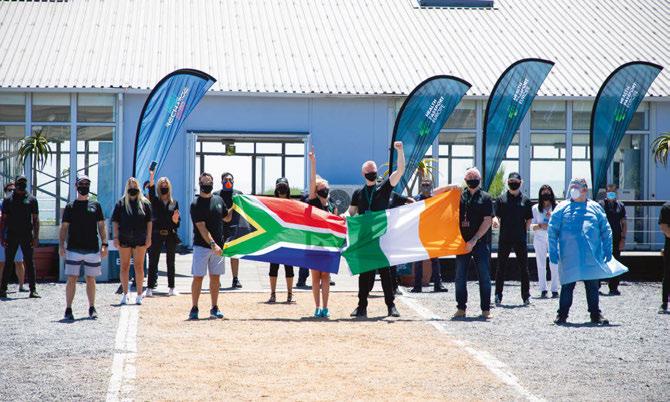
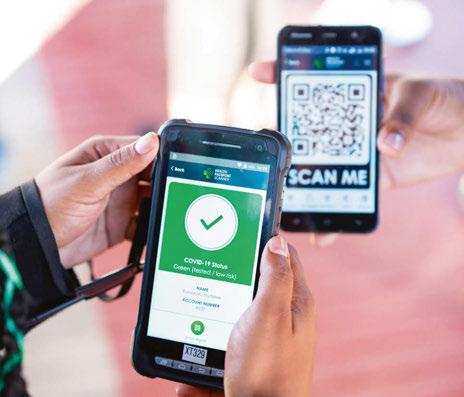

DIGIGRID KEEPS ABBEY ROAD INSTITUTE CONNECTED THROUGH LOCKDOWN
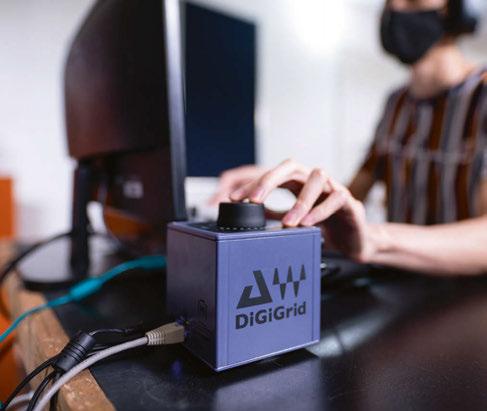
Based at Mastermax Studios in Midrand, Johannesburg, Abbey Road Institute teaches a professional one-year Advanced Programme in Music Production and Sound Engineering. Since it opened in February 2020, the educational institute has been able to offer its students access to the latest state-of-the-art equipment, including a number of DiGiGrid products as standard at each of its digital audio workstations.
The Institute’s Managing Director, Johan van der Colff, gave his thoughts on the products: “I was introduced to DiGiGrid products by a friend at Waves,” he began. “At the time, I was doing a lot of large channel-count multitrack recording that required MADI connectivity – I was first introduced to the DiGiGrid MGO and MGB products, which I started using as the interface for the events I was recording.”
That was seven years ago and van der Colff has since made further investments in DiGiGrid for the benefit of the local and international clients that record at Mastermax. By the time the Abbey Road Institute was brought into the facility, DiGiGrid was very much at the heart of the operation.
“We wanted to place the Abbey Road Institute’s educational programme directly alongside our commercial operation, believing that the only real way to learn this craft is with hands-on, on-the-job, apprentice-style training,” he stated. “The system allowed us to be very creative with the way we think about routing and in-class participation; since the whole classroom is on the SoundGrid network, students can easily share what they’re working on with the class by just assigning the classroom D interface to the students’ computer core audio.”
He added: “It also allows us to demonstrate to the students the future benefits of networked audio. We can sit in the classroom and access any device, in any room in the whole studio complex, be able to listen to what’s happening in other suites, do collaborative recording between different rooms, and really just push the system to the maximum of its capabilities.”
One more very important determinant was that the students have dedicated workstations in the classroom that they use for assignments. “We needed high-quality IO devices for each one,” van der Colff said. “The DiGiGrid units fit the bill perfectly, offering pristine recording and monitoring on a very small footprint.”
In the classroom, DiGiGrid M units are used for each student workstation, with a D at the lecturer’s station connected to the room speakers. In Studio A, an IOS and a DLI bridge AVID 192 IO interfaces, while a D is situated in the control room for local IO and room monitor outputs. The production suites, set up with a ‘home-studio’ vibe in mind, are equipped with D interfaces and are used by students throughout the first and second terms to learn how to manage resources and extract the best results from smaller setups.
Another IOS is deployed in the mix suite, feeding into an SSL SIX – the suite is set up as an analogue/digital hybrid to maximise creative flexibility. Because all the rooms are on the facility-wide DiGiGrid network, all rooms and workstations can access each other’s IO and servers if not utilised. Plans are also in place to introduce some IOX and IOC units for portable use anywhere in the facility where more IO capability might be required.
Within a month of opening, the Institute faced the massive challenge of a hard lockdown in South Africa due to COVID-19. “We certainly had to adapt fast,” van der Colff recalled. “While the theoretical side could be taught over Zoom, the fact that we were using the DiGiGrid M interfaces made it easy for us to give the students their in-class workstations to take home. This meant they had the right tools to properly complete their assignments and continue their learning experience in the best possible way.” Photos: Abbey Road Institute www.abbeyroadinstitute.co.za www.digigrid.net









